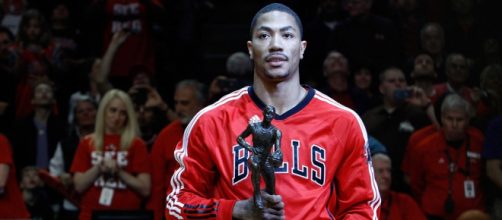Derrick Rose's career has been hamstrung -- not to be pun-ish -- by a bevy of injuries ever since declaring early for the NBA Draft. The operative term is early. The NBA, unlike the NFL, has tolerated the generally accepted attitude that 19-20-year-olds can handle the physical rigors of professional basketball. The sheer physical toll placed on the body in football is obvious and thus, you have to be a junior before declaring early for the NFL, whether through the standard 3 years spent at one school or prep-school and university attendance thereof.
LeBron James is one of those rare types who may have declared early and succeeded, but he was advanced beyond his years, both physically and in living life's lessons.
This has always been a fallacy, that basketball is not as physical. Because of its non-stop, rapid pace as opposed to football where you can take a 30-second break between each play, the play-clock in basketball is always running and requiring of each five-man-squad to get their offensive act together by the 15-second mark. All of the leaping and cutting by young men who aren't yet fully developed in some cases, and who also don't have the greatest dedication to a weight-lifting regimen, have always been and always will be susceptible to knee and ankle injuries.
Whatever happened to...?
The list of names of promising players who were off to promising starts in the NBA -- if not stellar stand-outs in college -- who then had their careers cut short or hampered is replete with high-profile, high-caliber players. Names like Tracy McGrady & Yao, Larry Johnson, Amare Stoudemire, Jamal Mashburn, Kevin Johnson, LaPhonso Ellis, Danny Manning, Gilbert Arenas, Grant Hill, Chris Webber, Ralph Sampson, and Brad Daugherty (many others) all represent a pantheon of players who were able to muster a semblance of a career after their injuries but were never able to fully shine.
More recently, there has been the likes of Brandon Roy, Greg Oden, and soon-to-be member of this club, Derrick Rose.
You could throw in Jay Williams as well (if 2003 isn’t too old a date) but that was an off-the-court incident. It's a unique club of players who both shined during their college careers and their first years in the NBA. The latter three played for NCAA national championships in their underclassman years.
Williams was the stalwart work-horse behind one of Coach K's five NCAA titles; Oden and Ohio State had a re-match with Florida which ended the same as the regular season meeting, leading to UF being the last school to two-peat; Roy, along with Nate Robinson, led Udub to multiple, high-profile Tournament appearances, including a #1 seed; and most recently and notable of all, Rose led a then-Coach Calipari's Memphis to the most wins in NCAA history, which were later vacated unfortunately due to academic shenanigans (the NCAA would say) relating to Rose's SAT scores.
It's the reason why UK has the record for the most wins -- regular season and Tournament combined -- under the very same Coach Calipari.
Maybe that's why both Rose left early for the NBA, and Coach Calipari left for UK but if there is such a thing as "bad sports-karma," it seems to have followed only the player, who may have known what was coming, and not the coach, who truly had no idea despite the heavily regulated recruiting process by the NCAA, especially when it comes to basketball, given the longer season versus questionable, academic records.
The NBA & NCAA need to require one extra year
Imagine the following scenario: A sophomore star who had a breakout, freshman year, is implored by his coach to dedicate more time to weight-training; versus an NBA star who came out his freshman year who is physically gifted but not physically developed as he could be.
Each arrives home at night after practice or games. The first is beholden to his scholarship, and, a-la Shaq, should never diminish the development of his own mind while billeting with a teammate, pondering about potential years to come. The second is beholden only to contract performances while gallivanting around with an entourage at the expense of the betterment of the individual NBA player -- for the potential partying of only days and weeks to come. Who is going to listen more and take steps to mitigate the unforeseen pitfalls of life?
The previous statement may read/sound harsh, but it speaks to why many a professional athlete, in general, is broke after their glory years have passed them by, like so many $20,000 a weekend spending sprees.
In closing, this author suggests a fireworks analogy in lieu of preaching a better, weight-lifting regimen: A bottle-rocket launches with a fast-burning fuse into mid-air, much like Derrick Rose and his reiterations of the two-step, two-handed dunk when he started that signature move. It is a quick but emotional charge that observers feel from such a display. The fuse is thin but fast-burning. Then there is the tried-and-true, but on the surface of it, dull-in-comparison, Fourth of July sparkler, thicker and slow-burning. Such sparklers last a long time, they have predictable but indeterminant moments of intensity yet don't flame out, and they meet their end in a kind of slow and steady fashion -- less remarkable than when they started out but appreciable nonetheless.
2017 #DerrickRose CAVALIERS & ROSE ARE ON SABBATICAL SINCE ANKLE INJURY | TIME 4 RETIREMENT?: https://t.co/OnRl5mEDiS via @YouTube
— POLISPORTSRANT (@OMSR_n_TPTC) November 29, 2017


